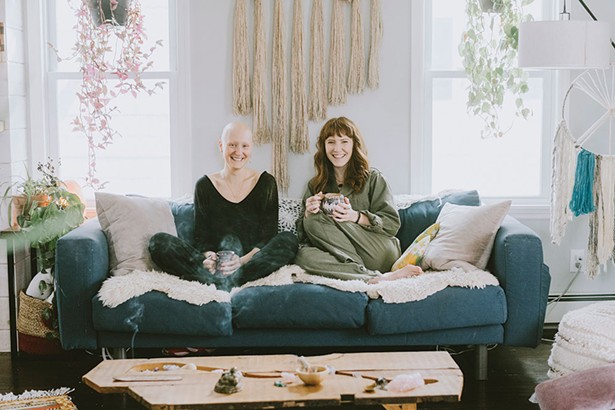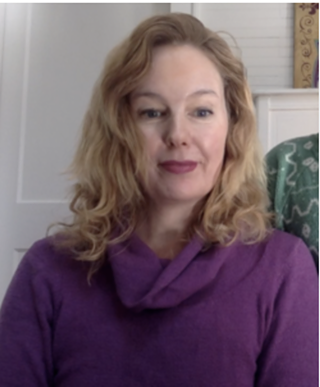As Alex Berke prepared to give birth, she cycled through an abundance of conflicting emotions. "The way everyone talked about it was scary—it was also exciting, thrilling, and full of love, but I was scared and I knew it would be a really big change." To Berke, so much felt daunting at the time: the expectations and advice coming at her from all sides, and the lack of experience that she and her partner had with the major transition of starting a family. "There are a lot of 'shoulds' with giving birth, and there's a certain negativity about the possibility of what could go wrong." So Berke contacted Alyia Cutler and Meghan Conway, both certified doulas and founders of Wyld Womyn, which offers birth and doula support, classes, events, and more out of its Main Street center in Beacon.
Her immediate intention was clear: Berke wanted a natural birth in the hospital, and, above all, to avoid having a C-section. Conway and Cutler were there for Berke—and with a hands-on approach throughout her labor and a calm encouragement born from years of experience as birth workers, they helped her achieve her goal of a healthy, natural birth. Yet the support Conway and Cutler offered Berke has extended far beyond the birth of her son. She also hired the duo to provide postpartum support, visiting her at home twice weekly in the first few months of her son's life to help Berke "set her house in order" by assisting with everything from crib construction and lactation support to infant-friendly travel planning. Even more, what Cutler and Conway offer Berke—and the women, female-identifying, and gender nonconforming clients they work with—is an opportunity to be seen, heard, and supported in their uniquely chosen path. "I felt empowered," Berke explains. "They were looking out for what I needed. Their attitude, then and throughout my journey into motherhood, has always been 'You can do this, and here's how.'"
Wyld Womyn's mission as doulas—whether it's through 'doulaing' birth, death, coming out, healing from traumatic events, abortion, or many other life transitions—is rooted in the practice of holding space for their clients. Through active listening and bearing witness, they utilize their own expertise or that of their extended network of professionals, as well as their ability to create community, to best serve the people who come through their doors. "We're expanding the idea of the word 'doula'. We take the values and roots of that traditional role and expand it to everything our clients need," says Cutler.
At their root, the offerings at Wyld Womyn reflect a broader shift in women's, and indeed human, healthcare—away from merely treating bodies, lifecycles, reproductive cycles, and sexual health as syndrome or sickness, and towards empowering people to tune into themselves. It's about understanding one's unique physicality to embrace an individualized approach to healing and a kind of radical self-care—as well as the community-building that happens when we give each other permission to speak and listen. This kind of approach is helping women to rethink old judgments as they take their reproductive health and sense of value into their own hands.
Beyond Con- and Contra-ception
Beacon's Wyld Womyn are not the only practitioners helping to empower a personalized approach to feminine health. Dyami Soloviev, based in High Falls, helps women tune into their bodies and rhythms through her practice Fertile Ground, which offers natural contraception coaching and classes. "You learn the language of your body," Soloviev explains as she describes her work teaching the fertility awareness method to women at various stages of their reproductive cycle throughout the Hudson Valley. The fertility awareness method—or FAM, for short—is a method of tracking the body's changes through a woman's monthly menstrual cycle. While there are multiple FAM-based methods, Soloviev teaches the symptom-thermal method, which tracks and records a combination of body temperature and changes in cervical fluid to pinpoint both ovulation and menstruation. Symptom-thermal involves a highly tuned examination of the body's subtle changes throughout the month, and then applies a detailed knowledge of both the female reproductive cycle and hormones to an individual's personal information. "The two primary fertility signals, the changes in cervical fluid consistency and waking temperature, when charted side by side, tell us different things at different points of the cycle," Soloviev explains. An "average" menstrual cycle consists of four phases: a pre-ovulatory phase, ovulation, a luteal—or progesterone dominant phase—and then menstruation. While the luteal phase is usually very regular for most women, the pre-ovulatory phase often varies from body to body. However, once a woman has a regular record of her cycle, she can begin to understand her own body and reproductive track and begin to plan around it.


















